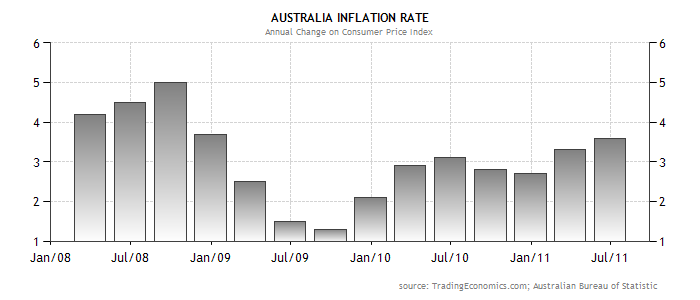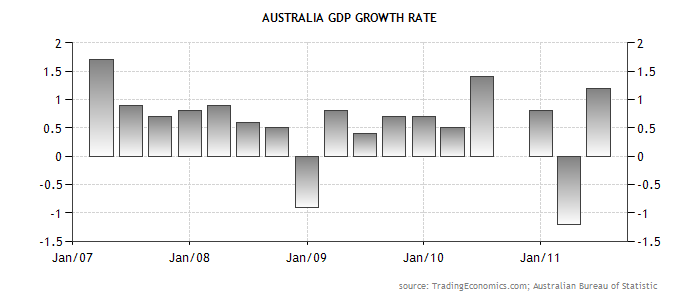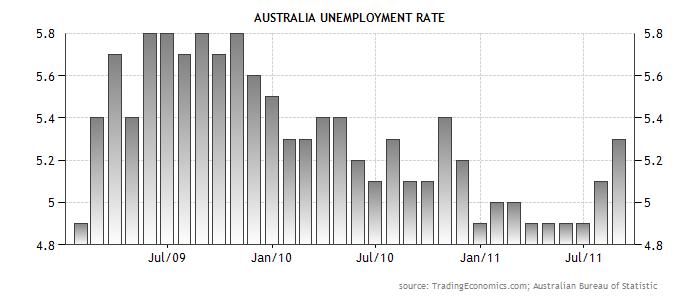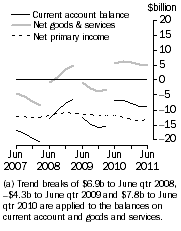Abstract
Australia is a steadily growing economy that can attribute its success to the economic policies that have been applied. This report evaluates the macroeconomic setting in economic growth, unemployment, inflation and trade. The investigations will discuss the performance after adoption.
Issues surrounding the macroeconomic policies will be discussed. Two major policies have been adopted and have been successful. The monetary and fiscal policies are most effective when applied within a short period. They have been implemented in creation of more water resources, expansion of the port, communication infrastructure, transport network and education. The policies have seen reduced rates in taxation, privatized the governmental enterprises and changed the structure of the enterprises.
The main challenge is that the electorate and the legislature have sometimes used the policies for their own interests. Another challenge is that employment is sometimes unsustainable. To overcome the challenges, reports on the implementation of the policies need to be documented and availed for analysis. This will also allow for transparency. There is also need to form independent groups to be in charge of the fiscal policy and monetary policy.
Introduction
The Australian government has been keen to attain economic growth, reduce the levels of inflation create sustainable employment and create opportunities for future, in terms of market. Due to the dynamics of the market, Australia has adopted policies that control the economic prospects in a changing market. This is a report on the macroeconomic policy settings for economic growth, unemployment, inflation and trade currently being applied in Australia.
The current macroeconomic setting in Australia
The economy of Australia receives greater revenue from mining and agriculture than from other services. In line with Travel Document Systems (2011, p. 1), government has benefited from exporting raw materials as well as manufacturing them.
Manufacturing therefore, is causing gradual economic growth and creating more trade opportunities while creating more employment. Redding & Venables (2004, p. 34) add that the policies that have been adopted have enabled Australia compete in the international trade.
Currently, the high tariffs and strict trade rules have been lessened to enable a steady growth and to control inflation.

Free trade characterizes the economy. Australia has also enacted policies that have made the currency remain afloat in a tough economic era. Furthermore, the financial sector has undergone reforms that have contributed to the positive outcome in the market and stability. For instance, the policies allow the use of foreign banks.
Australia has within its economic power, reduced the unemployment levels by allowing labor flexibility for workers. The government has also reviewed its structures to ensure that the systems allow for growth, reduce inflation, create more employment and lead to future trade opportunities. The structures of the government have undergone changes that have reduced overlapping of responsibilities and neglecting of some area and have instead become more objective and efficient.
Australia has privatized state owned enterprises as Travel document systems (2011, p. 1) reveals. This has led to increased investments both internally and externally. Consequently, the privatization has increased efficiency within the enterprise and has led to creation of more employment opportunities. The taxation system has also been reviewed. New policies ensure that the rates favor economic growth. The income tax rates have been reduced.
The government has been able to achieve the growth, after adoption of the macroeconomic policies. The monetary policy and fiscal policy have been adopted and made positive changes. The level of debts is expected to reduce after a continuous economic growth.
Analysis of the policies
Economic growth
Among the policies that the Australia has adopted, is the fiscal policy as discussed by Nguyen (2005, p. 2). The government uses the budget to manipulate the outcome of economic activities. This is possible because the government monitors changes and formulates policies that will assist in achieving its objectives.
When the economy is deteriorating, the government implements fiscal policies within a short span of time and redeems the market. This is achieved by reducing taxes and financial support for the expansion of the market. Consequently, more sales are realized and more investors become interested.
The government is also keen to avoid encouraging foreign investors. More so, the policies are designed to avoid encountering a deficit. As a result, the resources are distributed evenly (Keech 1995, p. 11). As a result of these strategies, the Country’s Gross Domestic product (GDP) growth has increased especially in the year 2011, second quarter. It grew by 1.20 percent in this second quarter.

Inflation
The fiscal policy affects the outcome of inflation. Gregory (1996, p. 2) says that the other policy that has been used is the monetary policy. To correct imbalances in the market, the government has purchased bonds, reduced interest rates, created avenues for investment and discouraged unemployment.
There are policies designed for the expansion of agriculture, communication, transport networks and education sector as discussed by Young et al (2008, p. 1). The government has invested in water because it recognizes the need for sustainable and reliable water for agriculture.
Irrigation has been used after the state has put up the structures and increased yield has been realized. Irrigation has been improved with the realization that the systems of water in Australia are underutilized. Wilkie & McDonald (2008, p. 1) add that education sector has increased its infrastructure to increase the number of people in need of training. The ports have also been improved with the desire to expand and allow for trade. Davis, G & Tunny (2005, p. 1) mention that the Australian government has been sensitive to the issue of global warming. They have taken measures that will reduce the carbon emissions. They have a trading system for carbon emission.
Employment
According to Travel document systems (2011, p.1), employment has increased with the adoption of the monetary and fiscal policies. What is more is that there are more full time employments with increased skilled. The employment seems to be more consistent even for full time employees in the year 2011.

Travel document systems (2011, p. 1) point out that there are international agreements that Australia has engaged in. Trade relations with China, United States as well as with other states have been established. It has also increased the output on manufactured goods.
Gruen (2001, p. 98) argues that the monetary and fiscal policies are not free from problems. They pose the challenge of shifting policies whenever there are changes in the market. This problem is rooted in the interest of the electorate wanting to work on their interests. Another challenge with the policies is the failure of providing reports hence; the legislature has taken advantage and concealed undesirable deals. It has also been noted that the fiscal policies and monetary policies face delays when it comes to implementation.
Trade into the near future
The macroeconomic setting in Australia is realizing growth and can maintain the trend by ensuring the policies are effective and go hand in hand with the dynamic of the market. It is likely to engage in economic partnerships with other economies. Trading with other countries will also boost the economy of the country. The Balance of Payment of Australia has not been very consistent and a lot need to be done to improve the current account. The trend is as shown in the diagrams below.

Conclusions
Australia has been able to adopt policies that have led to gradual economic growth, reduced unemployment, controlled inflation and increased trade. This is as a result of the monetary policy and fiscal policy. The policies have led to reforms in the transport sector and increased infrastructure in communication, irrigation, port and transport.
This is because it largely depends on agriculture and export of the minerals. The employment rates have increased and the inhalation of the currency remained controlled. The manufacturing sector has also grown and it is engaging in international trade. Another policy adopted includes environmental policy on carbon trading.
Sustaining the employment levels has been challenging while the shifting interest with the legislature concerning the policies has become challenging. The challenges will be contained if transparency and efficiency is achieved. Reports and the independence of the policies from the electoral and legislature will lead to more sustained growth, increased employment and low inflation.
Recommendations
In accordance with Phipps and Sheen (2008, p. 101), the government must review the employment trends and reduce the instability in the labor force. This can be achieved by adopting policies that meet shorter demand of the market. Moreover, it is necessary to consider the effects of shorter employment in a dynamic market with the aim of timing the opportunities in the market.
Developing institutions that have independence is necessary to enable economic growth. Moreover, reports on the activities that involve monetary policy and fiscal policy must be provided and analyzed to establish the success and the shortcomings. In addition, reports will increase the transparency in the process.
Reference List
Davis, G. & Tunny, G., 2005. International comparisons of research and development. Economic Roundup.
Gregory, R 1996., Some implications of the growth of the minerals sector in Australian Journal of Agricultural Economics, vol. 20 no. 2.
Gruen, N. 2001., Greater independence for fiscal institutions. OECD journal of Budgeting, 1, 89-117.
Keech, W. 1995., Economic Politics: The Costs of Democracy, Cambridge: Cambridge University Press.
Nguyen, D., 2005. Macroeconomic Policy in Australia. Web.
Phipps, A. J. and Sheen, J. R., 2008. Macroeconomic policy and employment growth in Australia. Australia: The Australian economic review.
Redding, S. & Venables, A., 2004. Economic Geography and International Inequality. Journal of International Economics, vol. 62.
Travel document systems., 2011. Economy. Web.
Wilkie, J. & McDonald, T., 2008. Economic geography and economic performance in Australia. Economic roundup, 3. 2008.
Young, A., Wilkie, J., Ewing, R. & Rahman, J., 2008. International comparisons of industry productivity. Australia: Economic Roundup.